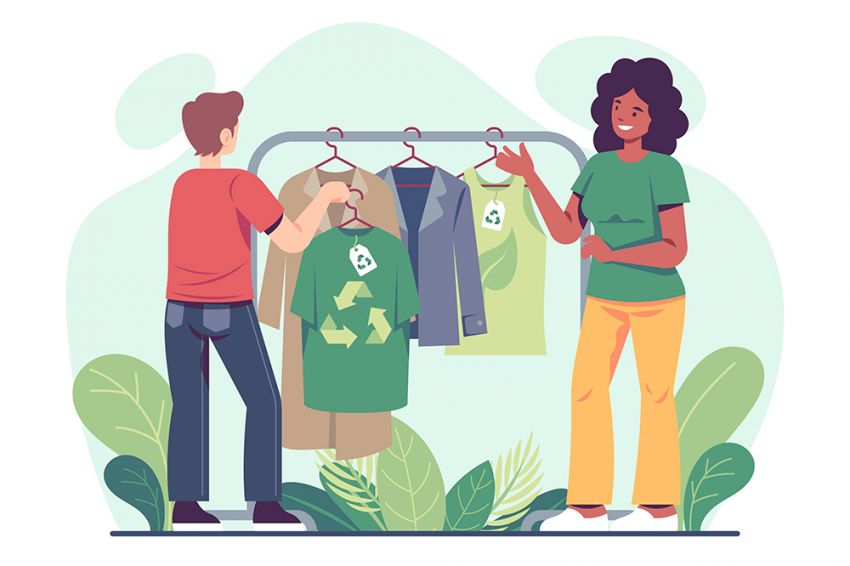The tourism industry is responsible for about 8% of global greenhouse gas emissions. Does that mean you should stay home? Fortunately, no.
You can explore the world while reducing your carbon footprint through green travel. All it takes is your commitment to making eco-conscious choices.
Get ready to go on the adventure of a lifetime with these tips on how to travel the world sustainably:
Table of Contents: 8 Green Travel Tips You Need To Know
1. Pack eco-friendly essentials
The key to packing sustainably is to pack what you already own. For example, you could pour your shampoos and conditioners into smaller containers instead of buying brand-new toiletries.
Even if your accommodation comes with pre-packaged toiletries, you should still pack your own to reduce plastic pollution.
Make sure to shop with sustainability in mind for the stuff you don’t already own. Opt for eco-friendly products such as reef-safe sunscreen, toothpaste bars, and organic towels.
If you’re travelling on your period, get yourself period panties instead of tampons which can take up to 800 years to decompose.
2. Bring your own water bottle
Worldwide, one million single-use water bottles are purchased each minute, making them one of the major contributors to plastic waste.
Fortunately, the solution is so simple that anyone can (and should) do it: bring your own reusable water bottle. That way, you can stop contributing to the plastics polluting our landfills and waterways.
Besides, there’s no need to buy disposable bottles of water, as plenty of places will refill your bottle for free. If you’re going to a place where tap water might be unsafe to drink, buy a bottle with a built-in filter.
3. Shop for sustainable fits
The most eco-friendly choice would be to wear what’s already in your wardrobe. However, if your clothes aren’t weather-appropriate for where you’re going, just make sure you don’t shop from a fast fashion brand.
Fast fashion is responsible for about 10% of global greenhouse gas emissions.
Try your hand at thrifting instead. Thrift stores are a treasure trove of pre-loved pieces, such as sweaters for winter vacations and flowy dresses for tropical trips. By saying yes to second-hand steals, you can spend your vacation in fresh, guilt-free fits.
Another option is to buy from sustainable brands that produce clothes made of recycled fabric. Or, if you don’t want to spend a penny, why not borrow clothes from friends and family? Now that’s one way to save the earth and money simultaneously.

4. Avoid air travel
Air travel may be the most convenient, but it’s the most non-eco-friendly.
Over 2.5% of global CO2 emissions come from the aviation industry, and while that doesn’t seem like a lot, keep in mind that CO2 isn’t the only gas that aeroplanes emit.
Trade aeroplanes for more eco-friendly modes of transportation, such as buses and trains. Not only will you be able to cut your carbon footprint, but you’ll also get a chance to do some sightseeing.
If you must fly, keep your carbon footprint as low as possible by flying with a sustainable airline. Many companies are fighting against climate change by using biofuels and removing single-use plastics from their aircraft.
5. Slow down and stay a while
Going on a whirlwind trip can be tempting, but it isn’t good for the environment.
In addition, travelling from one place to another can increase your carbon footprint, considering the number of times you’ll have to get on a plane, train, and other modes of transportation.
Rather than spending a few days in one destination, why not spend your entire trip in one place? That way, you’ll have more time to immerse yourself in local culture and cuisine.
Spending more time in one destination is also a great way to practice self-care while travelling.
A slow vacation might not be what a typical trip looks like, but it can be very satisfying. Remember, a vacation is supposed to be a time to unwind, not to worry about your itinerary. So instead of spending your time catching flights, why not spend it catching up on sleep?
6. Choose eco-conscious accommodations
Hotels have everything you’d ever need, but the downside is that most of them are far from eco-friendly. Not only do they generate a ton of garbage, but they also use more energy for hallway lights, elevators, and rooms where guests left their AC running.
In comparison, rental accommodations are more eco-friendly — in fact, a 2017 study found that by staying at an Airbnb, guests were able to save energy equivalent to over 800,000 homes.
To travel as sustainably as possible, book from home-sharing sites like Airbnb. Also, consider couch-surfing, which is a great way to connect with locals.
However, if you’re dead set on staying in a hotel, only choose among green hotels — these accommodations incorporate eco-friendly practices in their day-to-day operations. For example, many green hotels use renewable energy and recycle greywater for gardening.

7. Be mindful of your energy and water consumption
Whether you stay at a hotel or Airbnb, you should always be conscious of your consumption.
To save water, try to reuse your towel as many times as possible and only have it washed when necessary. Also, don’t forget to take shorter showers — according to the Environmental Protection Agency, the standard shower head uses 2.5 gallons of water per minute.
And since the average shower lasts 8 minutes, that’s around 20 gallons of water for every shower! So reducing your shower time by even one minute can substantially lower your water waste.
To save electricity, don’t forget to turn off the lights, AC, and other electronic devices when going out. If you’re vacationing in the winter, turning the thermostat a couple of degrees down results in energy savings of 10%.
8. Eat locally
Local restaurants use locally sourced ingredients, meaning less energy is used to bring your food from farm to table. And as a bonus, choosing local cafés over fancy 5-star restaurants benefits the local community instead of big companies.
Remember to order only what you can finish, so you don’t waste food.
Are you also travelling with kids?
It might take time to get used to new flavours, so don’t be surprised if they can’t clean their plates. To ensure they continue getting the nutrients they need, pack a green powder that you can mix into drinks they’re used to. That way, you won’t risk wasting food in case your kid doesn’t like the local cuisine.
Travel doesn’t have to be bad for the environment
Green travel shouldn’t simply be a trend — it should be how everyone travels going forward. By committing to being more eco-conscious, we can all visit places with peace of mind, knowing that we’re doing our best to reduce our environmental impact.
Because if we don’t, there might no longer be a beautiful world to see. Sustainable travel protects the planet, so we can continue to embark on new adventures for years to come.

















